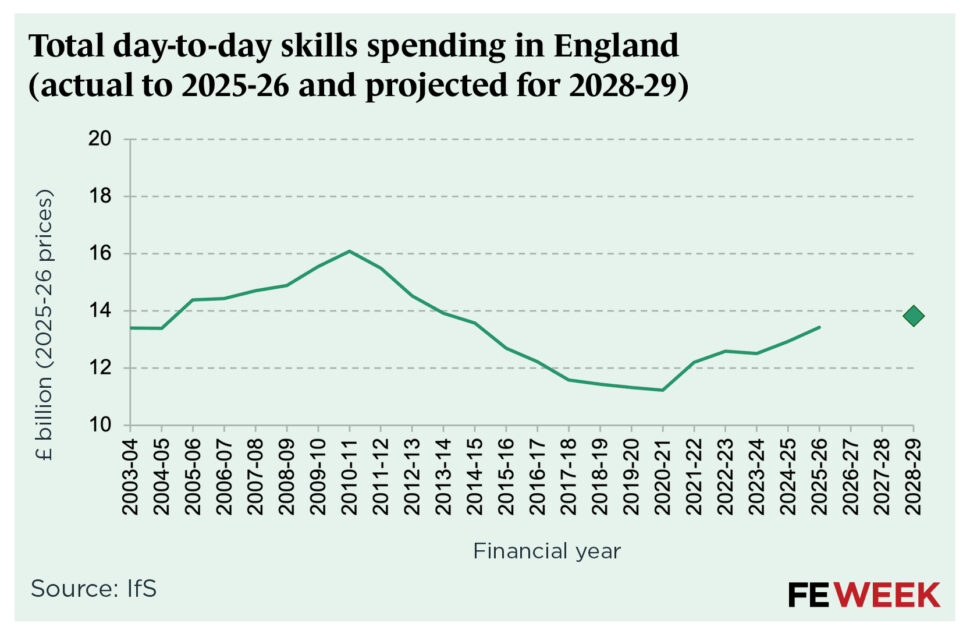The chancellor Rachel Reeves has delivered her much-anticipated spending review – arguably one of the defining moments of this Parliament so far. It sets the overall limits for day-to-day departmental spending through to 2028-29, and in doing so, begins to shape what’s possible for public services in the years ahead.
For DfE, she set out a £7.4 billion cash-terms increase in day-to-day spending between 2025-26 and 2028-29. In real terms, that equates to a 1.3 per cent rise in DfE’s total resource budget by 2029. Much of this uplift is expected to be frontloaded, with new funding likely to be released early in the review period.
What does it mean for overall FE funding?
Within the broader settlement, the government has announced an additional £1.2 billion per year in day-to-day funding for FE by 2028-29, in cash terms. After accounting for inflation, that will see the overall budget rise by just over £400 million (in today’s prices) between 2025-26 and 2028-29, a 3 per cent total real-terms increase over this period. That leaves FE – unusually – with a substantially faster growth rate than the education department as a whole.
The Treasury has not published a detailed breakdown, but this figure appears to cover the main areas of the FE and skills system: 16–19 education, apprenticeships, and adult skills. Together, these areas currently account for around £13.5 billion of public spending each year.
The chart below shows how total skills spending across these areas has changed since the early 2000s.

After a period of sustained growth through the 2000s, the FE and skills system saw sharp real-terms cuts through much of the 2010s. There has been some recovery since 2020, thanks to additional funding allocated by the previous government. But even after these recent increases, total spending remains well below the levels seen in the early 2010s.
The uplift announced yesterday continues the slow but recently steady increase in FE and skills funding. Based on the spending review plans, spending in 2028-29 will be at its highest level since 2014–15, although still well short of its peak in 2010.
How will this additional money be spent?
The spending review offered few details on how the extra funding for FE will be used. Aside from references to accommodating 65,000 more 16-19 year olds and training up to 60,000 skilled construction workers, specifics were in short supply. Further direction is expected in the upcoming post-16 education and skills strategy.
One area that is almost certain to absorb a substantial share of the funding is demographic growth. Since 2018, the 16-18 population in England has risen by 13 per cent – an increase of around 230,000 young people – with a further 5 per cent increase expected by 2028. If participation rates remain steady, that translates into around 65,000 additional students in the system.
Just to maintain existing per-student funding levels in real terms would require an additional £290 million in 2028-29 – roughly 70 per cent of the £400 million real terms increase that year. Any ambition to improve funding per learner, rather than simply preserve the status quo, would require a larger share of the settlement.
Staffing pressures are also likely to draw on the budget. The government has committed to recruiting more teachers into FE, but making that a reality will mean addressing long-standing issues with pay. College teachers now earn around £7,000 less than school teachers on average, and FE pay has fallen significantly in real terms since 2010. If recruitment and retention are to improve, a portion of the new investment will almost certainly need to go towards closing that gap.
What happens next?
At this stage, we still don’t know how the additional funding will be allocated across programmes and priorities. That will be one of the most important questions to watch in the months ahead. Much will depend on the direction set by the post-16 strategy and DfE’s decisions about how best to balance competing pressures.
Still, this is a substantial settlement in the context of the wider education budget. It goes well beyond offering real-terms protection to per-pupil college funding, and should make a meaningful difference to overall spending in the FE and skills system. If used well, it could start to relieve some of the pressures that have built up over more than a decade – particularly around funding levels and staffing.
















Your thoughts